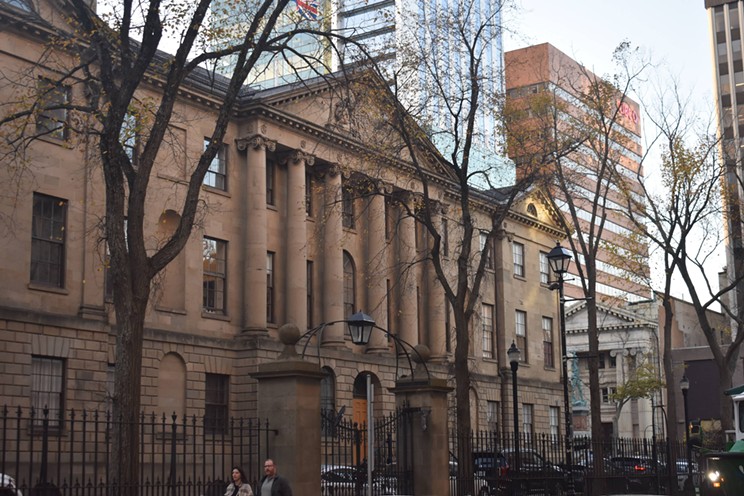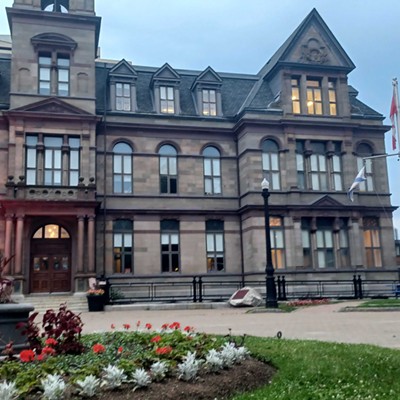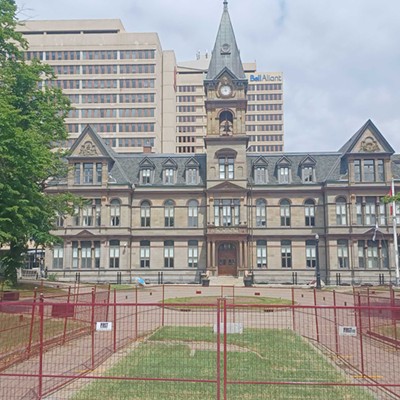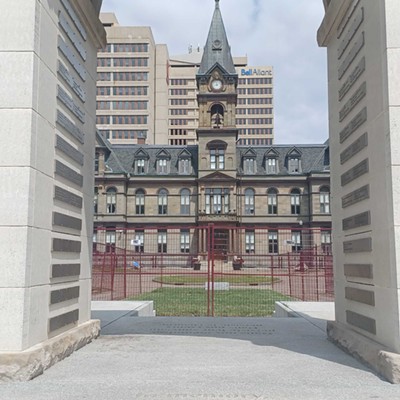Whenever a politician thinks they did something good, something bad, or really anything at all, they then turn to their supporters for adulation. Premier Tim Houston and his PCs are no different than any other political party and—right on queue, as the fall session ended—the party put out its vainglorious propaganda.
We've made tremendous strides in just over a year.
— Tim Houston (@TimHoustonNS) November 14, 2022
Our government will continue to stand up for you, including against the unnecessary federal carbon tax.
Let's keep working!
See more legislative achievements from the fall session: https://t.co/BXMj0pbqDu#nspoli #novascotia pic.twitter.com/9vO9ysqUP9
Some may take issue with the use of the word propaganda. It is worth noting the definition of that word is “information, especially of a biased or misleading nature, used to promote or publicize a particular political cause or point of view.” But is Houston’s tweet information used to promote his political cause of getting re-elected on or before July 2025? Is it misleading? For that, let’s take a deep dive and look closely at how Houston spent your tax dollars this fall and examine the extent to which he’s consolidated power into his cabinet.
The Museum Act was amended by Pat Dunn, the minister of communities, culture, tourism and heritage. This is a fairly minor housekeeping amendment. The three amendments were to change the name of the department to reflect Dunn’s job title. Dunn is now the minister of “communities, culture, tourism, and heritage” instead of just “communities, culture, and heritage.” Because what is Nova Scotia except communities that can be exploited for tourism? The chair of the Sherbrooke Restoration Commission is now a permanent member of Nova Scotia’s museum board of governors, which is a real thing that exists to advise the minister on museum stuff. The amendments also make the act gender-neutral. No longer does the museum’s board of directors require a chairman and a vice-chairman; women are now allowed to fill the roles.
The Public Utilities Act was amended by minister of natural resources and renewables Tory Rushton. This amendment defines how Nova Scotia Power is regulated by its oversight body, the Utility and Review Board. The jargon-heavy amendments make a lot of reference to how the UARB is to use “demand-side” economics in its decision-making processes. Demand-side economics is a core tenet of Keynesian economic theory, and these amendments codify Keynesian economic thinking into our public utility regulation. A brief sidebar about Keynesian economics: After the great depression, John Maynard Keynes posited a theory that the great depression could have been avoided if the factories kept making things and kept workers working. Then, yada yada, he did a bunch of math and posited that government spending could make the production of goods go up, which would mean more people are working, thereby increasing productivity. Notably missing from the broad strokes of his economic theory is ensuring workers are treated well and paid fairly for their work. It’s also worth mentioning that Keynes came up with this idea in the middle of The New Deal, so his theory may have been influenced by the assumption it would have the required associated progressive policies to be successful. Anyway, Keynesian economic theory is now a legislative requirement for Nova Scotia Power. The only reason to mention Keynesian economics is that Ronald Reagan successfully implemented this school of economics. However, he did so without associated policies to protect workers, which went, predictably, quite poorly. Since the PCs are taking a page out of his play book, in 50 years or so, expect Nova Scotia Power to be as good as the American health-care system.
My new hobby is taking graphs of economic data over time and indicating the year that Ronald Reagan was inaugurated, in case people find that helpful or informative. pic.twitter.com/jdLwHv8VNK
— Ward Q. Normal (@WardQNormal) December 15, 2019
The Public Utilities Act was again amended by Rushton. This is the piece of legislation that will limit the amount Nova Scotia Power can raise its rates, which is good for those feeling the crunch of high energy bills. However, this legislation also makes it harder for people to qualify for a loan to get a heat pump. So, yes, heating your house with oil will be cheaper short term. But this also means if you don’t already have a heat pump, you’ll also be on oil for longer. And, this piece of legislation won’t prevent Nova Scotia Power from price gouging later. It also doesn’t mandate Nova Scotia power improve its reliability or climate change resilience. So yes, it may mean that more people will burn more oil now, true—but on a positive note, more oil will also be burned later, and Nova Scotia Power has already stopped financing heat pumps. Man, it does seem like everything is set up to extract as much money from us as possible before the Earth burns up. Likely because our leaders have passed legislation that does exactly that. This sucks.
The Financial Measures Act was updated by Allan MacMaster, the minister of finance and Treasury Board. This amendment gives a tax break to people who have spent money on in vitro fertilization or surrogacy. It also gives corporations an additional tax break on their capital gains. A corporation's tax credit is now 25% (up from 15%) of “the aggregate of all amounts” that qualify for this tax break.
The Lichen Act, a private members bill from Jill Balser passed. Blue felt lichen (AKA pectenia plumbea) is now the province’s official lichen. Cool.
The Art Gallery of Nova Scotia Act was amended by Dunn. The changes bring the Art Gallery under his control and make the gallery a Crown corporation. Bit of a mixed bag on this one: It does mean that whoever is in power in Nova Scotia now has a lot more control over the gallery, but it also means steady funding. For the arts world, this move is also a bit of a mixed bag. There is a lot of disappointment that the PC government decided to scrap the new art gallery and keep the old one. But it’s also worth pointing out that, like music, visual art has headline acts and indie acts. Nova Scotia is good at pulling in the indie acts, but struggles to pull headliners east from Montreal or north from Boston, and this move might make big shows stop in Nova Scotia more frequently.
The Halifax Regional Municipality Charter was amended by John Lohr, the minister of municipal affairs and housing. This amendment gives the province a veto over municipal democracy. If the councillors we vote for do things we want them to do, the province can just say no. Take, for example, rock breaking. At the behest of many constituents, councillors decided to limit the hours when construction companies could break rocks. But the Nova Scotia PCs decided that we didn’t need democracy anyway and gave itself a veto over council to get rid of it (and any other municipal bylaws within six months of the bylaws being passed). There are a lot of ways this power can be abused, and Lohr is proving the province is ready to abuse its power and just lie to other elected officials. In an email obtained by The Coast, HRM CAO Jaques Dubé wrote to his colleagues about Lohr’s visit to lord his new power over city council: “I want you to know that the commentary by the Minister of Municipal Affairs, when addressing Regional Council on Nov. 8, was both discouraging and factually inaccurate.”
Lohr also dissolved the Municipal Finance Act, giving cabinet the power to veto municipal borrowing requests. The city can’t run a deficit, and the PCs can now veto municipal bylaws and deny city borrowing requests. The power to decide what gets built in the HRM, when and by who, is now very much consolidated into the hands of Houston’s government. Even though, constitutionally speaking, the province has always had this power over cities, it is uncomfortable to watch a bunch of rich white Tories start flexing their power.
The PCs passed the Housing Supply and Services Act. The point of this legislation is to funnel public money into private contractors’ pockets. Ostensibly and rhetorically, the PC government will claim this is good because the private sector is more efficient than the public sector at getting things done. Broadly speaking, this is correct. However, the private sector, when faced with a functionally limitless supply of taxpayer money, is not incentivized to be efficient. Since the private sector needs to make a profit—and it does, on government contracts—we the taxpayers are subsidizing a private industry to inefficiently underdeliver on a public good we desperately need. In spite of its misleading name, this bill is about your money. And how best to give your money to the private sector industry leaders who—especially in the development world of Halifax—just also frequently happen to be massive Tory donors. Surely, this is probably just a coincidence. Even though the province could legislate building targets, or just build housing without a profit motive, Tim Houston has instead decided the best way to help Nova Scotians is to give their hard-earned money to the private sector to subsidize profits. Instead of just, you know, building housing. Surely, that will be fine, though. Surely, Houston did not run for premier only to “help a variety of companies reach their full potential.” Even though that is, after all, the reason he gave for being identified as a player in one of the largest investigations into global tax evasion. Surely, he’s a changed man.
The province has also created a new Crown corporation, Invest Nova Scotia, which, according to the press release, will “increase accountability, drive economic growth and support businesses to grow and prosper.” Invest Nova Scotia may in fact do what it’s supposed to (unlike that last time when Stephen McNeil gave millions of Nova Scotia taxpayer dollars to Sandpiper, which it spent on plates, yes like dinnerware, investing in a BC-based company). However, it’s just as likely a corporation designed to support businesses to grow and prosper leaves the workers in the dust, as most of these programs have since the 1980s.
The 911 Act was also amended by Lohr, post-Fiona. Houston’s government claims this legislation will hold “telecom companies accountable.” However, this legislation does not do that. It instead says telecom companies “shall take reasonable actions” to ensure customers don’t get service interruptions. Even though this definition legally might include preventative maintenance, the thing that’s supposed to ensure compliance is a fine of up to $250,000. Bell made $22.88 billion last year; this fine would be 0.00001% of its annual earnings. For people who earn the Nova Scotia average of $57,500 a year, this penalty is the equivalent of your boss making you come to a mandatory seminar but only fining you $0.0057 if you don’t go. Since the fine for service interruption is functionally nothing, this does not, in fact, hold “telecom companies accountable.” With fines this low, the amoral influence of profit means that, with this legislation, paying a fine and doing repairs after a failure is cheaper than spending money on preventative resilience. This legislation just straight-up sucks and demonstrates a truly naive understanding of how communications companies treat their customers in the modern iteration of capitalism.
Elizabeth Smith-McCrossin from Cumberland North got the Amherst Curling Club incorporated as a non-profit.
Rushton got the Electricity Act amended to include a bit about hydrogen. This sets the province up to make, store and refine hydrogen if it wants to. Not much more to say about hydrogen, but just remember it’s only as clean as the power that makes it. If Nova Scotia Power decided to start making hydrogen today and used its coal-based power to do it, it would be functionally greenwashing coal. Greenwashing coal is something Houston has done as recently as September of this year. Houston’s office helpfully clarified to The Guardian that the government’s environmental commitments were really more like targets. Very reassuring to hear that children having a habitable planet is more of an aspirational target than a commitment. (Rushton also passed an associated housekeeping bill allowing us to hide our greenwashed coal underground in the Underground Hydrocarbons Storage Act.)
The Gaming Control Act was amended by MacMaster, the minister responsible for the act. This change consolidates the power of regulating gambling into Houston’s cabinet. And beyond that, the act’s purpose was changed. The Gaming Control Act used to read: “The purpose of this Act is to ensure that any measures taken with respect to casinos and other lottery schemes are undertaken for the public good and in the best interests of the public and, without limiting the generality of the foregoing, to minimize the opportunities that give rise to problem gambling and other illnesses, crime and social disruption.” It now reads: “The purpose of this Act is to ensure that any measures taken with respect to casinos and other lottery schemes are undertaken for the public good and in the best interests of the public.” What is in the best interests of the public? Well, without the definition spelled out in the act anymore, and with the power consolidation, it means Houston’s cabinet decides the public good. This means Houston is now the sole decider of how much gambling addiction can be exploited for “the best interests of the public.” Good times ahead now that power has been consolidated, decision-making has been made more opaque and clear, publicly accountable definitions of “the best interests of the public” are gone. In a very real way, these legislative changes allow the government to reach into gambling addicts’ wallets and put the money directly into the pockets of private developers.
Michelle Thompson amended the St. Francis Xavier University Act. This seems to be an administrative change to allow St. FX to govern itself as it deems necessary.
The Labour Standards Code was amended by Jill Balser, the minister for labour, skills and immigration. This legislation, known as Ruby’s Law, was passed with support from all parties. If a pregnancy has an outcome other than a living child, this legislation gives five bereavement days to the immediate family members affected by the loss. What a family member is, is also very broadly defined to be as inclusive as any legislation can be while still trying to legally legislate grief.
Greg Morrow, the minister of agriculture, made the once-arms-length food-researching organization Perennia Foods into a Crown corporation.
Kim Masland, minister of public works, brought Develop Nova Scotia under provincial jurisdiction by making it a Crown corporation called Build Nova Scotia.
Brad Johns amended the Regulations Act to change the reporting requirements of how the province tells everyone it changed the laws of the land.
In the musical The Man of Lamancha, the main character of the play-within-the-play, Don Quixote, tries to fight a windmill and loses. He loses because a human on a horse can’t win a joust with a windmill. Anyway, Tim Halman, the minister responsible for climate change in Nova Scotia, got on his horse and tilted at a favourite Conservative windmill, the carbon tax (AKA carbon pricing). This is the provincial government’s “output-based pricing system” alternative to the federal carbon tax, but the feds have poo-pooed Houston’s plan. And much like Houston can legally enforce his will on the municipality, so too can prime minister Justin Trudeau legally enforce his will on Houston.
Johns, the minister of justice, amended the Builders’ Lien Act. This creates an adjudication process for contractors who are trying to extract payments from their subcontractors. Hey, did you know that if a private company is contracted to do a public contract and subcontracts that contract, then your tax dollars subsidize both the main contractors’ and subcontractors’ profits? The main efficiency of the private sector is its ability to accumulate wealth.
Houston introduced the Protecting Access to Health Services Act, which means it’s now doubly illegal to harass health-care workers.


















